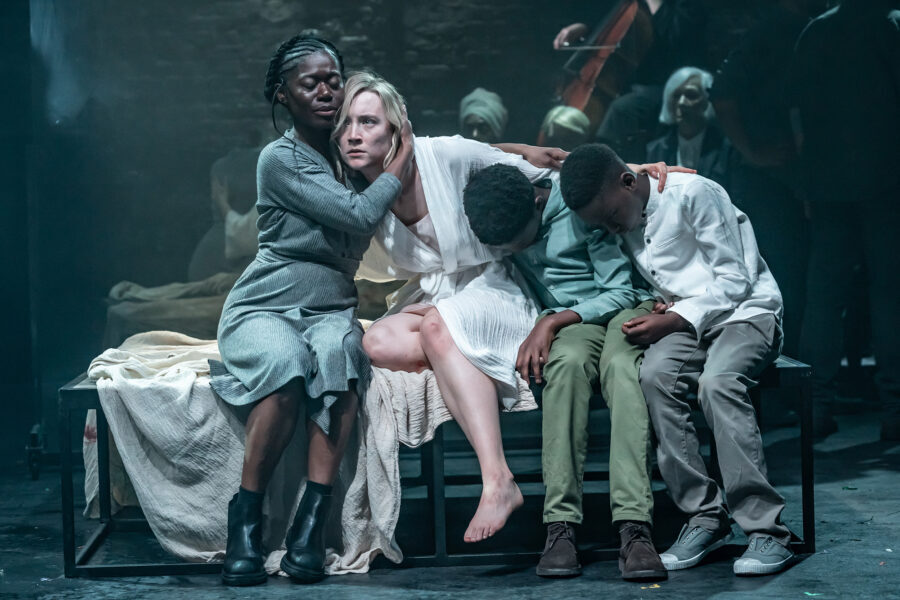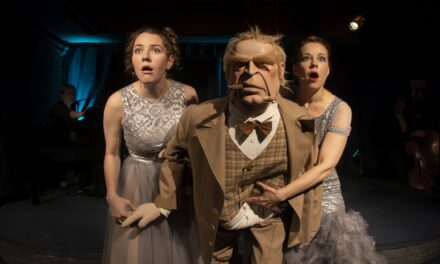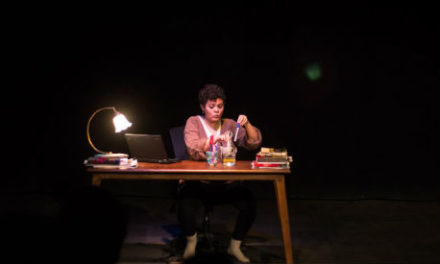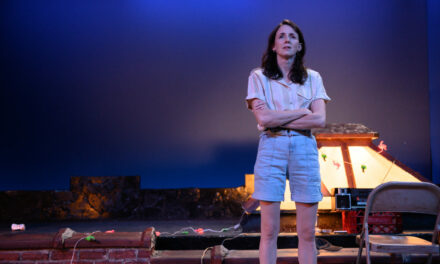What does it take to stretch Shakespeare’s shortest tragedy to a runtime of over three hours? Not, as it turns out, a tedious crawl through the play. Rather, an electrifying but patient journey through its nooks and crannies, like the one gloriously undertaken by Yaël Farber’s Tragedy of Macbeth at the Almeida Theatre. Armored with commanding performances by James McArdle and Saoirse Ronan, and bathed in an exquisitely dark imagination, Farber’s take on the Scottish play manages to be both visceral and cerebral in its intensity.
Things seem astir even before Farber’s production starts. We find ourselves facing a meticulously abandoned stage, ghosted by the material remnants of a prior performance: a ghost light, a wheelchair, an oxygen tube, a cello, a standpipe, and a wheelbarrow full of boots are among the items that populate Soutra Gilmour’s circular, intimate set design. They simultaneously look back on and foretell a story that binds them together. Tim Lutkin’s achingly fierce lights and Peter Rice’s rhythmic sounds build a disquieting ambiance. We are soon initiated into a ritualistic world where near-modern dresses and props become preys to water, blood, and grime.
Faber interprets Macbeth as a concentric tragedy where the borders between the public and the private, the outer and the inner, are porous. The production’s bare-bones aesthetic is buttressed by a richly textured dramaturgy of primal icons, motifs, and motions: bison skulls, kilts, silken sheets, glass partitions, and frequent hand-washing help concoct a raw mystique that permeates many of the scenes. The earthen quality of Farber’s direction uses understatement and matter-of-factness (especially in the naturalistic lilt of much of her cast’s speech) to yield trenchantly theatrical, and moving, outcomes. Her assured, harmonious actors resemble an army of earthbound spirits, especially when they all descend upon the stage at the beginning and watch in charged silence the ‘Wyrd’ sisters pulling the trigger of the action.
Diane Fletcher, Maureen Hibbert, and Valerie Lilley make up this calmly grotesque trio of women, each clad in a dark suit and delivering her omens in crisp, deadpan utterances. They serve as the bystanders of what they foresee, spectating, with suggestively blank stares, this tale of vaulting ambition and decaying sanity. It is a tale, too, powered by excellent performances. James McArdle is a husky but surprisingly tender Macbeth, whose hesitance about the Wyrd sisters’ premonitions is as affecting and as persuasive as is his gradual surrender to the scorpions of his mind. He is joined at the throne by an incandescent Saoirse Ronan, who, in her UK stage debut, delivers a breathtaking Lady Macbeth, rife with revelatory nuances.
McArdle and Ronan’s crackling chemistry is that of a power couple who can’t keep their hands off each other. They are a perfect match, which gives credence to the logic of their mutual goadings. Ronan’s performance seems to embrace the idea that Lady Macbeth, rather than being inherently cruel, has in fact a compassionate nature which she wants to overwrite with “direst cruelty,” sourced from outside. This grafting is, of course, ultimately not successful, as she reacts with legible glimmers of perturbation to Macbeth’s increasing resolve to kill anyone who might stand in his way.
Farber’s staging underlines this trajectory with a major intervention into the scene where Lady Macduff (a magnetic Akiya Henry) and her children are murdered: the messenger who warns Lady Macduff is here replaced by Lady Macbeth, who delivers a fleeting warning and ends up staying there as a horrified witness to a series of brutally rendered killings. It is this moment, in Farber’s interpretation, that tips Lady Macbeth over the edge and triggers her subsequent sleepwalking.
Other members of the cast handle their parts with corresponding strength. William Gaunt is a grandfatherly, wheelchair-bound Duncan, soft-spoken but still vindictive. Ross Anderson’s Banquo is a tellingly stiff, diplomatic figure, whose ghostly visitations in the later scenes induce tantrums in an unhinged Macbeth. Emun Elliot compellingly presents a reserved Macduff who snaps after learning of his family’s death. In part due to the dynamic elegance of Emily Terndrup’s movement direction and Kate Waters’s fight choreography, the whole ensemble navigates the relatively small playing space with a fluidity that motors the whole production.
The action is frequently underscored by Aoife Burke’s onstage cello performance and pulsates with a rhythm that both grips and unnerves. Towards the play’s close, these elements culminate in a grand dirge, with Lady Macbeth’s dead body lying upon a shallow pool of water, as if presiding over Macbeth’s own unravelling. These moments, including the final, water-soaked duel between Macbeth and Macduff, offer an undeniably harrowing vision of the play’s tragic arc.
A Macbeth with such star power could have easily taken resort in the commercial and artistic strength of its cast and let its directorial vision lie fallow. But Farber simply refuses to commit this mistake. From start to finish, her interpretation is a marvel to behold and a delicious mystery to come to grips with. When the hurly-burly’s done, with the cycle of violence set to start anew, “anon,” one is tempted to ask for the show to go on.
This post was written by the author in their personal capacity.The opinions expressed in this article are the author’s own and do not reflect the view of The Theatre Times, their staff or collaborators.
This post was written by Mert Dilek.
The views expressed here belong to the author and do not necessarily reflect our views and opinions.


















